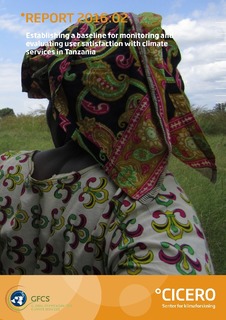| dc.description.abstract | This report is an output from the Global Framework for Climate Services Adaptation Program in Africa (GFCS-APA) Tanzania country activities. The aim of the report is to establish a baseline for monitoring “User Satisfaction with Climate Services” at the national, district, and local levels, with a focus on the programme target districts of Longido and Kiteto. A qualitative approach was employed to document 1) existing institutional coordination and steering mechanisms for a dedicated climate services platform at the national level; 2) respondents’ awareness of and access to climate information and services at national, district and local levels; 3) respondents’ perceptions of the ‘usability’ of climate information and services, and 4) the role of indigenous knowledge (IK) about weather, climate, and related adaptation options. Following Cash et al., (2003), we analyzed “user satisfaction” in relation to respondents’ perceptions of the credibility, salience, and legitimacy of climate information and services. Key findings include: 1) A national steering mechanism for climate services has been adopted, but there is a need to strengthen institutional coordination across all scales; 2) Awareness of and access to climate information and services are highly variable across institutional scales, indicating a need for increased awareness of the concept of climate services as well as efforts to enhance delivery of climate information; 3) Perceptions of the credibility of climate information and services are paramount to increasing user satisfaction, and depend upon respondents’ experience using climate information in practice. Mismatches between the timing of decision-making and the production and delivery of forecasts, as well as the limited spatial and temporal resolution of climate information and products, undermine the salience of climate information. The way in which forecasts are currently packaged and communicated presents additional challenges to understanding and interpreting the information for practical decision-making. At the local level, disparities in capacities to access and benefit from climate information and services and the potential for climate information to take on political implications when attached to specific advice pose challenges to the legitimacy of climate information and services development. 4) IK was seen as being particularly important to decision-making at local levels, where it gains its credibility through the long-term observations it is based on, as well as the experience that communities already have working with this knowledge. Incorporating IK within climate services development is necessary to enhance the legitimacy of the processes and the applicability of the knowledge that is generated to local decision-making, but there are a number of challenges to incorporating scientific and indigenous knowledges. The findings highlight that improving user satisfaction with climate services will be a long-term process that requires capacity building among producers, intermediaries, and users at all levels, particularly to promote innovation in delivery, communication, and tailoring of climate services products. Developing knowledge that is salient, credible, and legitimate in particular decision-making contexts will also require long-term collaboration, as well as transparency about the strengths and limitations of scientific information and open dialogue about the various ways in which stakeholders at different scales assess the credibility of climate information. Based on the analysis, the authors put forward twelve recommendations to improve user satisfaction with climate information and services in Tanzania in the future. | en |

